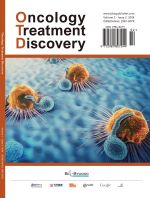Abstract
Objective: To observe the clinical efficacy and safety of regorafenib combined with immune checkpoint inhibitors in the treatment of patients with advanced colorectal cancer of pMMR/MSS type. Methods: 42 patients with advanced colorectal cancer of pMMR/MSS type admitted to the Department of Oncology of our hospital from January 2022 to September 2023 were randomly divided into the observation group and the control group, 21 cases each. The observation group was treated with the addition of regorafenib combined with immune checkpoint inhibitors, while the control group was given regorafenib monotherapy, and the efficacy, adverse effects, and survival of patients in the two groups were observed. Results: the total remission rate of the control group was 23.81%, and the total remission rate of the observation group was 57.14%, and the difference between the two groups was statistically significant (P < 0.05); there were 14 cases of adverse reactions in the two groups, with an incidence rate of 33.33% (14/42); and the overall survival rate of the observation and control groups was 71.43% and 47.62%, respectively. The survival rate of the observation group was higher than that of the control group, but the difference was not statistically significant (P > 0.05). Conclusion: Regorafenib combined with anti-PD-1 monoclonal antibody can significantly improve the efficacy and prognosis of advanced colorectal cancer without increasing adverse effects.
References
Zhang X, Zhou J, 2022, Research Progress of Third-Line Targeted and Immunotherapy for Advanced Colorectal Cancer. Journal of Henan University (Medical Edition), 41(6): 391–399.
Wei L, Zhang Y, 2019, Progress of Internal Medicine Treatment for Advanced Colorectal Cancer. Shandong Medicine, 59(1): 86–90.
Kong Y, Xiong Y, Liu J, et al., 2023, Clinical Efficacy Observation of Regorafenib Combined with PD-1 Agent in the Treatment of Recurrent Metastatic Colorectal Cancer. Chinese Contemporary Medicine, 30(20): 50–53.
Li Q, Li Y, Zhang S, 2023, Nursing Care of Adverse Drug Reactions in Colorectal Cancer Patients Treated with PD-1 Inhibitor Combined with Regorafenib. Journal of Nursing, 38(15): 27–30.
Lu C, 2023, Analysis of Dosage Characteristics, Effectiveness and Safety of Regorafenib in the Treatment of Advanced Colorectal Cancer in the Elderly. Chinese Prescription Drugs, 21(2): 136–138.
An TQ, Song LJ, Zong H, et al., 2022, Observations on the Efficacy of Regorafenib Single-Agent Backline Treatment for Metastatic Colorectal Cancer: A Retrospective Study. Colorectal and Anal Surgery, 28(4): 342–347.
Yan J, 2021, Observations on the Efficacy and Adverse Reactions of Regorafenib in Third-Line Treatment of Metastatic Colorectal Cancer. China Modern Drug Application, 15(24): 171–173.
Gao H, Wang L, Lai X, 2020, Phase Ib Clinical Study of Regorafenib Combined with Natalizumab for Advanced Gastric or Colorectal Cancer. Evidence-Based Medicine, 20(4): 217–221.
Chen D, Sheng L, Wang L, 2019, Adjusted Indirect Comparison of the Efficacy and Safety of Fruquintinib Versus Regorafenib in Third-Line Treatment of Advanced Colorectal Cancer in Asians. Journal of Clinical Oncology, 24(10): 919–924.
Xie Y, 2023. Observation on the Efficacy of Fruquintinib Combined with PD-1 Inhibitor in Fourth-Line Treatment of Advanced Colorectal Cancer. Medical Theory and Practice, 36(14): 2404–2406.
